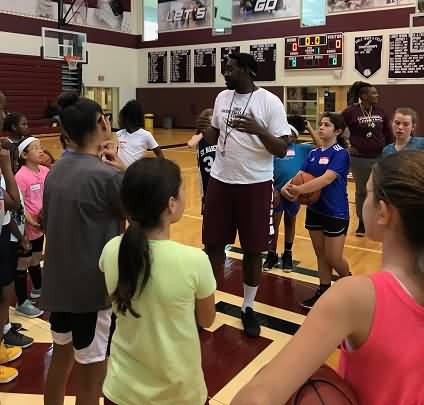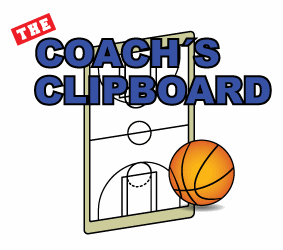5 Ways Coaches Can Help Their Student Athletes in the Classroom - by Sarah Daren
From the Coach’s Clipboard Basketball Playbook"Helping coaches coach better..."

Sarah Daren
Coaches are important influences in their players' lives. They need to help students balance their dual responsibilities and emphasize the importance of academics for their students' futures. Even if a student does go on to become a professional athlete, chances are good that they will need a solid academic record in one way or another.

Here are 5 ways coaches can help their student athletes achieve in the classroom.
Teach Effective Time Management Strategies
Students often struggle with time management, especially when they have lots of extracurricular activities and sports to factor in. Skills like time-blocking, which provides a specific plan and visualization, can help students be more realistic about how much time they will need for studying, practice, games, and rest.
It's also important for students to learn how to set academic priorities for effective time management. Coaches can encourage students to keep a to-do list, set reminders, and use website blockers to help them reduce distractions when studying. Different athletes will need different strategies and a good coach can help them identify what works best.
Create a Culture of Academic Support & Success
Although coaches understandably emphasize a student's athletic efforts, putting no emphasis on academics can make them seem less important than they are. A coach needs to not only encourage athletes to make schoolwork a priority but also create a culture of academic support and success within the team environment.
So, what might this look like? It might involve being more flexible about scheduling to allow students more time to study, providing educational resources, facilitating study groups and mentorship, and celebrating academic successes as a team. There are many ways to create this kind of supportive culture that will help student athletes thrive academically.
Build Personalized Goal Plans
Having both academic and athletic goals is important for student athletes. It can help them define their priorities and set them up to value their academic successes alongside their athletic triumphs. Coaches can help players create personalized goal plans that keep them motivated and inspired throughout the school year. These plans can be adjusted as needed to help keep student athletes moving forward.
Understand & Leverage Different Learning Styles
Coaches have a similar role to teachers- they need to help their students learn new information and methods of problem-solving. Not every student has the same learning style, however, and coaches need to understand the different methods and mediums used in modern teaching.
Identifying a student's learning style can take some trial and error, but it's well worth the effort. Coaches can use that information in athletic training and when directing students to the best academic resources for their needs. Adapting coaching and teaching approaches in this way will lead to better outcomes overall.
Promote Better Mental and Emotional Well-Being
Students who participate in competitive sports have busy and hectic lives. Frequently, they don't practice enough self-care and end up overly stressed and burned out. Maintaining good mental health and emotional well-being is critical for both academic and athletic performance.
Coaches can help promote mental and emotional well-being in many ways, such as by leading students in practices like deep breathing and yoga. They can also help by emphasizing proper rest, diet, and decompression activities. These kinds of stress management techniques can help students improve their outlook and boost their academic achievement.
Remember: Coaches Have Influence!

A coach who has built trust among their student athletes can be a powerful force for good in players' lives. Players look to their coaches for guidance and will follow their lead. Encouraging students to take their studies seriously helps to set themselves up for success in the future!
Articles by Sarah Daren
- Costs of School Athletics Is Increasing: 4 Things You Must Know
- Coaching 101: 4 Ways to Promote Leadership
- 3 Insights on the Declining Number of Athletic Officials
- 5 Reasons Why Coaches Make Great Teachers
- Avoiding Drug Abuse in Adolescence Through Athletics
- Maintaining Student-Athlete Stress Levels
- 4 Tips for Athletes Looking to Transfer Schools
- Top Sports Trends of 2018
- Importance of Athletic Scholarships
- Should You Go Back to School for Your Coaching Degree?
- 4 Benefits of Coaching Into Old Age
- The Pros and Cons of Athletes using Social Media
- The Importance of Good Health and Nutrition for Athletes
- 4 Ways to Inspire Kids to Exercise
- 4 Technology Resources That Athletes Can Utilize for Better Performance
- 5 Benefits of Coaching Youth Athletics
- 5 Ways Youth Sports can Boost Mental Health
- 5 Benefits of Playing Sports Abroad
- 6 Benefits of Playing Sports in School
- Emotional Intelligence Can Help Athletes in Sports
- How Sports and Exercise Impact Your Health and Well-being
- Sports and Exercise Tips for Students
- Best Educational Programs for Young Athletes
- Can Alternative Health Improve Athletic Performance?
- 5 Tools For Coaches Who Want Their Athletes To Do Better In Class
- What Student-Athletes Need to Know About Vaping
- Bionic Technology in Sports: Changing the Game for Sports Injuries
- How Coaches Keep Students Engaged During Online Schooling
- Do You Need an Advanced Degree to Pursue a Career in Exercise Science?
- How to Prevent Hazing in High School Sports
- The Impact of a Great Coach in Youth Sports
- The Future of Personal Branding in College Sports
- Should Student Athletes be Paid?
- Staying in the World of Sports After Your Athletic Career is Over
- How to Pursue a Career in Sports Media
- Why Not Think About a Degree in Sports Journalism
- You Didn't Go Pro, Now What?
- Why Athletes Should Focus on Nutrition to Reduce Injuries
- How Accessible are U.S. Youth Sports
- Social Work Tips That Can Positively Impact Your Coaching Ability
- Six Tips for Being an Excellent Youth Coach
- 10 College Majors for Students Looking for a Career in Sports
- Coaching Young Players with Speech Issues
- How to Maximize Fundraising Efforts for Your Youth Sports Team
- How Cross-Training and Proper Diet Can Provide a Competitive Edge in High School Sports
- How Youth Sports Can Positively Impact Low-Income Neighborhoods
- Importance of Teaching Young Athletes to Give Back to Their Communities
- 5 Ways Coaches Can Help Injured Players Recover
- 5 Ways Coaches Can Help Their Student Athletes in the Classroom
- Evaluating the Many Types of Mentorships in Sports
- Athlete Burnout and Mental Fatigue
- Ways to Use Your Experience as an Athlete to Motivate and Inspire Others
- How Organized Sports Can Transform Lives of Troubled Youths
- Should You Coach Your Child's Youth Sports Team?




